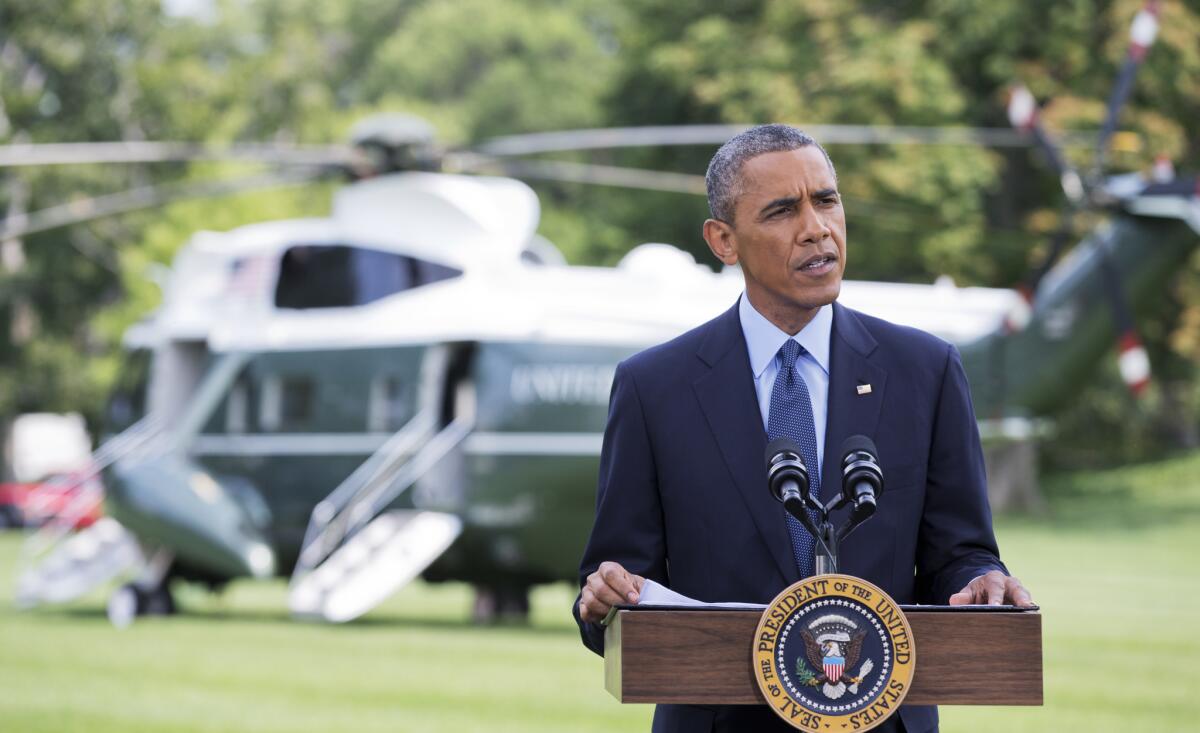Op-Ed: What should Obama do about Russia and the INF Treaty? Channel Reagan.

- Share via
The U.S. government concluded this week that Russia violated the 1987 Intermediate-Range Nuclear Forces Treaty by testing a prohibited cruise missile. The question now is what to do.
Withdrawal from the treaty would be a mistake. The INF Treaty required the elimination of all U.S. and Soviet land-based ballistic and cruise missiles with ranges between 500 and 5,500 kilometers. As a result, the two countries destroyed 2,692 missiles.
In deciding how to respond, the Obama administration should consider the example set by President Reagan in 1983, when U.S. officials revealed that the Soviets had begun building a large radar installation at Krasnoyarsk, in central Siberia. The Anti-Ballistic Missile Treaty set limits on such radars, including a specification that they be located on a country’s periphery and oriented outward. The Krasnoyarsk radar should have faced south. It instead faced east, overlooking a long stretch of the Soviet Far East, in clear violation of the treaty’s terms.
The Reagan administration could have chosen to withdraw from the ABM Treaty. It did not. Instead it raised the violation in the Standing Consultative Commission, the treaty’s compliance body. Senior U.S. officials, including the president, pressed the issue with their Soviet counterparts.
Not only did the Reagan administration continue to abide by the ABM Treaty, it negotiated new arms control agreements with the Soviets despite the blatant violation. In 1987, Reagan and General Secretary Mikhail Gorbachev signed the INF Treaty, and they made major progress on the Strategic Arms Reduction Treaty. But it wasn’t until 1990 that the Soviets corrected the violation and agreed to tear down the Krasnoyarsk radar. The next year, the START treaty was signed.
The approach taken by the Reagan administration, and the George H.W. Bush administration that followed it, paid off. By not overreacting, Washington was able to conclude new agreements that significantly reduced the nuclear threat to the United States and its allies.
Several factors argue for continued U.S. observance of the INF Treaty, at least for the foreseeable future.
First, evidence of the Russian violation is probably highly classified, which would make it difficult for the U.S. government to share information publicly. If Washington cannot present compelling evidence of the Russian violation, the United States could be seen by the world as the party that killed the INF Treaty. The Russians certainly would do everything in their power to pin blame on the United States.
Second, the U.S. military currently has no plans for new intermediate-range missiles of its own. Any such missiles would take years to design and build, and would take funds from other pressing defense priorities. U.S. withdrawal from the treaty would leave Russia free to deploy new intermediate-range cruise missiles and ballistic missiles as well, with little prospect of a U.S. missile to deploy in response.
Third, even if the Pentagon were to build intermediate-range missiles, they would have to be based either in Europe or in Japan or South Korea to reach significant targets in Russia. But few if any allies would be eager to accept such missiles.
Not pulling out of the INF Treaty does not, however, mean that President Obama shouldn’t respond to the Russian violation.
His administration should press Russian officials, through the Special Verification Commission established by the INF Treaty and through other channels, to come back into full compliance and to take steps to demonstrate that.
It should also emphasize to NATO and Asian allies the U.S. readiness to take the high road and stay within the treaty while pressing Moscow on its violation.
And finally, it should engage America’s allies, as well as China and other Asian and European states, on the issue of Russia’s missile test, and encourage them to raise this issue with Moscow. After all, if the Russians were to proceed to build a new intermediate-range cruise missile, those states would be within its range while most, if not all, of the U.S. would not.
Steven Pifer directs the Brookings Institution’s Arms Control and Non-Proliferation Initiative. A former senior director for Russia, Ukraine and Eurasia on the National Security Council, Pifer also served on the U.S. delegation to the INF negotiations in the 1980s.
Follow the Opinion section on Twitter @latimesopinion
More to Read
A cure for the common opinion
Get thought-provoking perspectives with our weekly newsletter.
You may occasionally receive promotional content from the Los Angeles Times.









